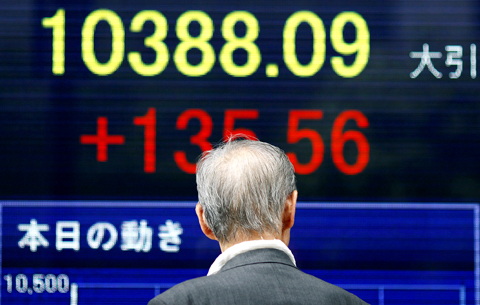Japan’s broadest indicator of economic health rose at the fastest pace in 29 years, signaling the nation’s deepest postwar recession is easing.
The leading index, a composite of 12 indicators including stock prices and consumer confidence, climbed to 79.8 in June from 76.9 in May, the Cabinet Office said yesterday in Tokyo. It was the largest advance since comparable data were made available in January 1980. The median estimate of 15 economists surveyed by Bloomberg News was for 79.7.
“The report suggests Japan’s economy may have entered an expansionary phase and the recovery may be sustainable,” said Susumu Kato, chief economist at Calyon Securities in Tokyo. “Even as weak employment conditions continue to weigh on the household sector, production and exports are recovering, helping corporate profits.”

PHOTO: AP
Japan’s economy grew at an annual 3.8 percent pace last quarter from a record 14.2 percent contraction in the first three months, according to a Bloomberg News survey of economists. Industrial production surged 8.3 percent last quarter, the biggest jump since 1953, a report showed last week. Exports gained in June from a month earlier.
“Companies have brought forward inventory adjustments and exports are increasing,” said Yoshiki Shinke, a senior economist at Dai-Ichi Life Research Institute in Tokyo. “That signals Japan’s economy is on a recovery track.”
Investor optimism that the worst is over for Japan has also spurred a 47 percent gain in the Nikkei 225 Stock Average since March 10, when it reached a 26-year low.
The rebound in global demand hasn’t spread to households, whose outlays account for more than half of the economy. The unemployment rate rose to a six-year high of 5.4 percent in June, and economists expect it to reach a postwar record next year. Wages fell at an unprecedented pace that month as companies slashed bonuses.
Coincident index, a measure of the current state of the economy, rose for a third month to 87.8. The three-month moving-average of the index, which the government uses to make its monthly evaluation, rose to 87 in June, the second monthly increase, the report showed.
The Cabinet Office left its assessment of the coincident index unchanged after raising it for May, saying the gauge is showing signs of bottoming.

People can preregister to receive their NT$10,000 (US$325) cash distributed from the central government on Nov. 5 after President William Lai (賴清德) yesterday signed the Special Budget for Strengthening Economic, Social and National Security Resilience, the Executive Yuan told a news conference last night. The special budget, passed by the Legislative Yuan on Friday last week with a cash handout budget of NT$236 billion, was officially submitted to the Executive Yuan and the Presidential Office yesterday afternoon. People can register through the official Web site at https://10000.gov.tw to have the funds deposited into their bank accounts, withdraw the funds at automated teller

PEACE AND STABILITY: Maintaining the cross-strait ‘status quo’ has long been the government’s position, the Ministry of Foreign Affairs said Taiwan is committed to maintaining the cross-strait “status quo” and seeks no escalation of tensions, the Ministry of Foreign Affairs (MOFA) said yesterday, rebutting a Time magazine opinion piece that described President William Lai (賴清德) as a “reckless leader.” The article, titled “The US Must Beware of Taiwan’s Reckless Leader,” was written by Lyle Goldstein, director of the Asia Program at the Washington-based Defense Priorities think tank. Goldstein wrote that Taiwan is “the world’s most dangerous flashpoint” amid ongoing conflicts in the Middle East and Russia’s invasion of Ukraine. He said that the situation in the Taiwan Strait has become less stable

FRESH LOOK: A committee would gather expert and public input on the themes and visual motifs that would appear on the notes, the central bank governor said The central bank has launched a comprehensive redesign of New Taiwan dollar banknotes to enhance anti-counterfeiting measures, improve accessibility and align the bills with global sustainability standards, Governor Yang Chin-long (楊金龍) told a meeting of the legislature’s Finance Committee yesterday. The overhaul would affect all five denominations — NT$100, NT$200, NT$500, NT$1,000 and NT$2,000 notes — but not coins, Yang said. It would be the first major update to the banknotes in 24 years, as the current series, introduced in 2001, has remained in circulation amid rapid advances in printing technology and security standards. “Updating the notes is essential to safeguard the integrity

REASSURANCE: The US said Taiwan’s interests would not be harmed during the talk and that it remains steadfast in its support for the nation, the foreign minister said US President Donald Trump on Friday said he would bring up Taiwan with Chinese President Xi Jinping (習近平) during a meeting on the sidelines of the APEC Summit in South Korea this week. “I will be talking about Taiwan [with Xi],” Trump told reporters before he departed for his trip to Asia, adding that he had “a lot of respect for Taiwan.” “We have a lot to talk about with President Xi, and he has a lot to talk about with us. I think we’ll have a good meeting,” Trump said. Taiwan has long been a contentious issue between the US and China.